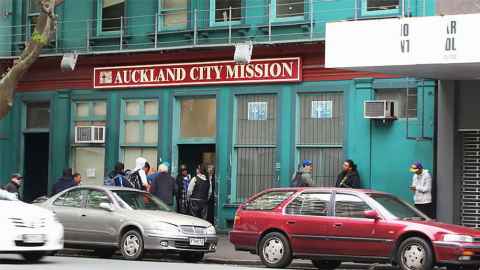Christmas is about food and family – but not for all
9 December 2019
Opinion: Alumna Helen Robinson, from the Auckland City Mission, sees the depth of poverty in Auckland every day. At no time is it more visible than at Christmas.

As an Auckland City Mission employee, every day I see the depth of poverty in our city and am very aware of the difficulty many people have in regularly putting food on the table. Over the last few years, the need has increased. Our most recent information shows a 40 percent year-to-year increase in demand for emergency food parcels.
The requests came from many different Aucklanders. We support both families and those living alone, right across the city. Some people seek our help only for a short time when they are facing unexpected or extra living costs. Others need our support for long periods of time because, quite simply, their income doesn’t meet their expenditure. Some are working more than one job but still can’t meet all their living costs.
This reality is even more obvious to me and all of those who work at the Mission during our Christmas food and gift services across Auckland. Last Christmas, across a number of sites, I witnessed thousands of people who lined up from the early hours of the morning to be handed a food parcel – containing the basic pantry ingredients – and a gift for their children.
I couldn’t understand why, that in New Zealand – this beautiful land of plenty, people simply didn’t have enough food and were forced to seek support to feed themselves and their families. It was particularly apparent because Christmas is a time when many New Zealanders enjoy wonderful family times filled with plentiful food and gifts.
The sight of people lining up day after day fuelled my passion and set my on my own journey to investigate food insecurity, what that means, and how it impacts our community.
Food insecurity is about more than hunger. Hunger is a physiological experience caused by a lack of food – a person can feel hungry if they are running late and skip breakfast. Food insecurity, also called food poverty, is not having enough appropriate food. And, as we see at the Mission, there are many Kiwis experiencing this on a daily basis.
Unless we choose to intervene and change the status quo, we are condemning all those who are food insecure to being unwell at least half of their days and to suffer distress, for as long as the food insecurity lasts. For some, that is years.
The research I undertook was in conjunction with community partners and researchers at the University of Auckland. We surveyed more than 650 people who were accessing our food bank services and what we uncovered was a clear relationship between food insecurity, emotional wellbeing, and psychological distress. We learned that food insecurity is intrinsically linked to poverty and causes distress and reduced wellbeing. We found that nearly 40 percent of those surveyed have struggled to access enough appropriate food for them and their household for two years or more. Two years!
So why is this happening in our country? The reality is, once housing costs are paid, low-income individuals and families are often forced to choose between buying food and meeting other essential costs. When there’s no money for food, people either eat poorly or miss meals completely. They have no choice but to rely on food banks to provide them with enough food.
I estimate that approximately 10 percent of New Zealand’s population is affected – that’s about 500,000 people.
To overcome this deeply worrying issue, we need to distribute the resources we have differently. Perhaps therein lies the real challenge. Unless we choose to intervene and change the status quo, we are condemning all those who are food insecure to being unwell at least half of their days and to suffer distress, for as long as the food insecurity lasts. For some, that is years. This particularly affects women, women raising children, women sole parenting, Māori and Pasifika.
We have a way to go to understand the effects that food insecurity in New Zealand will have on our community in terms of health and wellness. Here at the Auckland City Mission, with the help of donations from our generous supporters, we will continue to support, and uphold, the dignity, individuals and whānau.
The Mission is calling for New Zealanders to help change the situation. We need an annual survey to gather more information, which will develop a national food strategy. The strategy will give vision and direction to solutions.
Particularly needed is women-oriented interventions, such as raising the level of the Sole Parent Support-payment and providing further financial assistance to women raising children. Finally, we need to raise income levels and ensure a living wage for all.
For Christmas this year, while I will be with my family, not far from my thoughts will be those who need the Mission’s support over this time. Especially, the women and children in line to receive food parcels and whose need for the essential food items drove the research that hopefully will make a difference in their lives one day. Meri Kirihimete.
Donations to the Auckland City Mission can be made here. For more information about Shining the Light on Food Insecurity in New Zealand, follow the link here.
Helen Robinson is General Manager of Social Services at Auckland City Mission and a graduate of the university’s Master of Social and Community Leadership.
This article reflects the opinion of the author and not necessarily the views of the University of Auckland.
Used with permission from Newsroom Christmas is about food and family – but not for all 9 December 2019.
Media queries
Alison Sims | Research Communications Editor
DDI 09 923 4953
Mob 021 249 0089
Email alison.sims@auckland.ac.nz